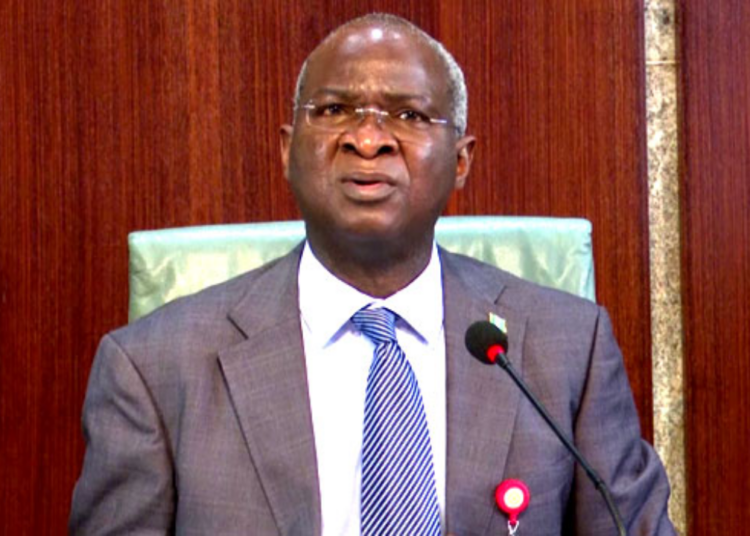In an address in Lagos, Mr. Babatunde Raji Fashola, erstwhile Governor of Lagos State, Nigeria, and former Minister of Works and Housing in the Buhari administration in Nigeria, an administration that arguably ran Nigeria aground. Fashola presented a passionate and compelling message titled: “Why I Remain Optimistic About Nigeria.” The speech was at the 60th birthday lecture of the publisher of City People magazine, Mr. Seye Kehinde, on Thursday, April 24, 2025.
Fashola’s speech was an appeal for national hope and resilience. He emphasised the strengths inherent in Nigeria’s cultural richness, human potential, and the importance of unity. He extolled the nation’s cultural depth, entrepreneurial energy, and the uncommon resilience of her citizenry as assets for national redemption. His message, delivered with characteristic conviction, was a call to national hope and perseverance amid Nigeria’s complex crises.
While such depths of optimism and patriotic zeal are commendable, it is imperative to critically assess the underlying factors that challenge such a perspective. Fashola’s message, though well-intentioned, sidestepped the systemic leadership deficit, rampant corruption, administrative/institutional decay, and the external dynamics, not to mention the infrastructure deficits that have made meaningful progress elusive.
Leadership Failure and Corruption: The Glaring Contradictions
The core issue afflicting Nigeria is not the absence of human or natural resources but the sustained failure of leadership. From the local through the states to the federal levels, governance is often tainted by opportunism, incompetence, and corruption. The optimistic narrative Fashola portrays stands in stark contrast to the lived experiences of many Nigerians who contend daily with failing infrastructure, unemployment, insecurity, and a justice system many consider compromised.
Fashola only scantily touched on the pervasive and fundamental issue of corruption, referencing it only through a non-justiciable constitutional provision that seeks the abolition of corruption. He had no time in elaborating on the failure since 1999 of the National Assembly (NASS) to enact a law that would, for instance, allow easy access to asset declarations of public office holders. Fashola’s passing mention is insufficient given the devastating impact that corruption continues to have on governance, insecurity, public trust, and national development.
His attempt at promoting national optimism, brand image protection, and patriotism, whilst failing to adequately confront corruption with the same intensity, does not make for a more balanced approach to the issues thrown up. The inability to handle corruption flows from a leadership deficit concerning a visionary approach that focuses on popular interests. The persistent gross inadequacies in governance have led many articulate Nigerians to seek a redefinition of corrupt values towards genuine progress and development.
The persistent erosion of public trust is evident in the widespread perception of corruption across various arms, levels, and sectors of Nigeria. Findings from a nationwide corruption perception survey I conducted in 2024, which has been published as a book: Nigeria Corruption Perception Data, show that a vast majority of Nigerians, well over 80%, believe corruption has either worsened or remains widespread. The survey, involving 1,426 respondents across all geopolitical zones, revealed that:
- 748 respondents (more than 52%) rated Nigeria as “extremely corrupt”.
- Over 90% expressed dissatisfaction with the transparency and efficiency of public services.
- Encounters with corruption were most prevalent in the public sector, followed by the private and social sectors.
- Religious and civil society institutions, once seen as moral bastions, were also implicated, with 88% of respondents agreeing that even religious organisations are corrupt.
Similarly, according to a recent NOI-Polls result, 80% of Nigerians believe that their country’s corruption level has increased over the past year, with the police and the national assembly perceived as the most corrupt institutions. This perception is not unfounded, as numerous high-profile corruption cases involving former governors and public officials have surfaced, highlighting systemic issues within the leadership structure.
The ridiculous levels of corruption and leadership deficit continue to promote large-scale underdevelopment, poverty, and unlivable conditions for many Nigerians. This situation further moves many Nigerians away from utmost freedom (the UN’s Sustainable Development Goals coupled with access to the benefits accruable from the Universal Declaration of Human Rights).
These data sets present a very different picture from Fashola’s upbeat and all-is-good tone. Like they say, “In God We Trust absolutely, but all Men Must come to the Table with Data”. It is based on these data that we shall begin to examine the basis and reality of the high hopes and patriotic excitements that Fashola is trying to propagate.
Patriotism Examined: Between Love for Country and Disillusionment
It is a disservice to equate blind loyalty in the face of stark realities with patriotism. True patriotism does not entail defending a broken/failed system or remaining silent in the face of injustice and oppression. Rather, it requires a sober critique and active engagement for necessary reforms. It is such critiques that lead to improvements in societies. The silence or “siddon look,” towards societal ills, not to mention deceptive praise singing in the face of the stark realities, actually constitutes a disservice to Nigeria.
It is not in doubt that ordinary Nigerians deeply love and care about their country, as seen in their resilience and persistent demand for accountability, as well as their failure to organize to throw off their yoke of oppression. What is in doubt is how much love and commitment the people who have been handed over the jobs of managing the material resources, governance, and leadership apparatus of the country, truly have for the country. Very painfully, Nigeria’s challenges continue to compound their sufferings.
– Prof. Badejo, author of a best-seller on politics in Kenya, was a former Deputy Special Representative of the UN Secretary-General for Somalia, a former Professor of Political Science and International Relations at Chrisland University, Abeokuta
A deep analysis would demonstrate the lethal situation of the combined effects of leadership deficit, coupled with corruption, and a failure of leadership to make the best of the external environment. Such visionary leadership would be opposed to the current reality of being willing tools for the continued external subjugation of Nigeria. Important is also the failure of leadership to start or maintain the process of building viable institutions, and expand the horizon on the paucity of human and material resources.
In effect, leadership deficit remains central to the increasingly unbearable lives of Nigerians, hence severing the people from desirable quantum moves towards utmost freedom. Even the most passionate patriot is forced to confront the painful dissonance between the preferred eulogy for patriotism and the lived reality. The lived realities of the average Nigerian make the Fashola type of calls, couched under the pretense of patriotism, very hollow.
Realistic Optimism and Accountable Leadership
While Fashola appeals for collective hope, Nigeria’s development continues to fail to leapfrog towards development in comparison with countries with similar trajectories, like India, Malaysia, Indonesia, and South Korea. This cannot be ignored in calling for Nigerians to raise their heads high in patriotism. Since gaining flag independence around the puerile decolonisation period, those countries, with relatively better visionary leadership and lower levels of corruption, have made significant gains in economic diversification, infrastructure, and human development indices. Clogged by cyclical corruption and poor governance, Nigeria has squandered decades of opportunities for internal consolidation and regional leadership. Love of country does not need to be from the pulpit in these countries. People are living reasonably and improving the realities of their lives.
It is time to move beyond rhetorical hope. True national healing requires hard truth-telling, actionable reforms, and people-centred leadership. The escapist argument that all societies are corrupt should be avoided. Many societies that are meeting the needs of their people through development have effective institutional arrangements to radically reduce levels of corruption, as opposed to Nigeria’s tolerance level for the cancer.
The inverse relationship between the known number of Nigerian billionaires (many are not on the Forbes list as a result of hidden wealth) and the poverty level in Nigeria is largely a result of corruption. It is a result of live and direct outright theft, as well as deliberate policies to gouge the public. The resulting inequalities and inequities cannot build the type of patriotism Nigeria had in the 1950s through to the mid-1980s when oil blocks started being handed to individuals, thereby privatising the life-line of national patrimony without value addition. The result has been reduced levels of peace and security, development, respect for human rights, and humanitarian resilience.
The 2024 corruption survey I conducted shows a population that is engaged, informed, and yearning for transformation. Nigeria’s future cannot be built on beautiful aspirations and emotive patriotism, but must be anchored in a collective demand for transparency, justified expectation, equity, responsible governance, and freedom from want on many needs of living a good life. At the top of such a governance arrangement must be visionary leadership able to reverse some of the corruption, adequately respond to the external environment, as well as handle institution building and expansions on human/material resources.





